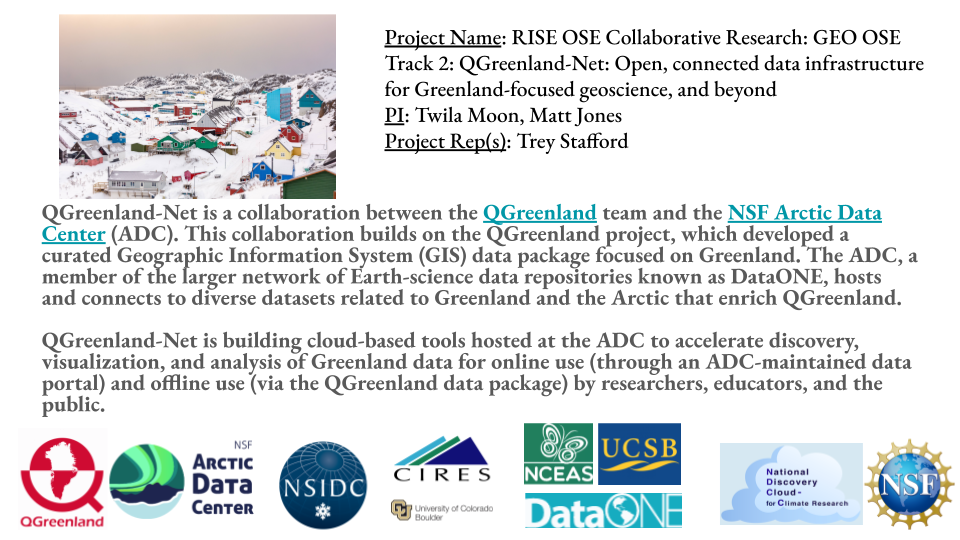2024-03-26: National Discovery Cloud for Climate (NDC-C) workshop notes
The National Discovery Cloud for Climate (NDC-C) workshop took place from March 6-8, 2024 in San Diego, CA. Trey Stafford attended the workshop on behalf of the QGreenland-Net project.
Per the workshop website:
The National Science Foundation (NSF) initiated the development of a National Discovery Cloud for Climate (NDC-C) to “federate advanced compute, data, software, and networking resources, democratizing access to a cyberinfrastructure ecosystem that is increasingly necessary to further climate-related science and engineering”. The NDC-C builds on many existing efforts supported by the CISE and GEO directorates across the entire science vertical from hardware to foundational infrastructure to software services to core climate research to community activities.
There were ~30 projects represented, ranging from infrastructure work (e.g., new HPC resources) to research projects focused on answering earth-science questions using cloud-computing resources (e.g., permafrost landscape analysis in the Arctic). Discussions ranged from long-term visions of a cloud-based computational environment that users interact with through AI natural-language interfaces to what we can do as a disparate group of individually-funded projects in the next 6-18 months.
The NDC-C is a 2-year pilot that aims to lay the foundations for an NDC that will cater to a wider science community.
There were many discussions about AI, and comparisons between the NDC-C and the National Artificial Intelligence Research Resource Pilot were highlighted by the NSF reps in attendance.
Two NSF representatives were present at the meeting, Marlon Pierce (CISE program director), and Amy L. Walton (CISE Deputy Office Director).
Workshop activities
The workshop utilized the collective impact framework. Collective impact focuses on identifying and setting shared goals/objectives, defining measures for success, and emphasizing collaborations. Collective impact also places importance on defining a “backbone” organization/team that will help to align and coordinate group work.
The workshop was comprised of guided discussions, breakout groups, and networking/collaboration time.
Guided Discussions
There were two guided discussions facilitated by the workshop organizers:
A conversation with Elizabeth Simmons, Executive Vice Chancellor, UC San Diego, about how the collective impact framework has been successfully utilized by UC San Diego.
A panel discussion about equity and education in climate research. Panelists were:
- Olivia Graeve, professor at UC San Diego
- Dr. Maureen A. Guarcello, director of program evaluation at San Diego State University
- Leah Kraus, Secretary of the Minorty Serving Cyberinfrastructure Consortium (MS-CC)
Breakout groups
Breakout groups were utilized for focused discussions on topics guided by the collective impact framework and goals of the NDC-C. Breakout groups included discussions on:
- Setting a common agenda, guiding priciples, and goals for the NDC-C.
- Establishing a shared system of measuring succcess/failure.
- Defining mutually reinforcing activities & identifying areas of collaboration.
- Identifying mechanisms for continous communication between NDC-C stakeholders.
- Brainstorming the establishment of a “backbone support organization”. For example, conversations about the development of an NSF community office that would coordinate NDC-C activities were discussed in this breakout session.
Networking & collaboration
The workshop organizers emphasized networking and establishing collaborations between projects. These collaborations were highlighted as examples of how individual projects could work together and build upon successes to have collectively broader impacts.
Collaborations that I explored while attending the conference included:
- Lakshmi Subramanian and Ankit Bhardwaj of the EAGER: Scalable Climate Modeling using Message-Passing Recurrent Neural Networks project are working on AI models that could be leveraged by QGreenland-Net to suggest/automate the creation of data transformation workflows.
- Joanmarie DelVecchio of the Elements: A workflow for efficient and reproducible permafrost geomorphology analysis project is interested in using the tools we develop to find and extract data of contextual importance to study sites in Greenland.
- Pelican: Advancing the Open Science Data Federation Platform
- Pedro Ramonetti Vega and Sergey Gurvich of the National Data Platform Pilot: Services for Equitable Open Access to Data project spoke with me about the possibility of connecting the ADC/DataOne to the National Data Platform, which provides AI tools to support data discoverability.
Workshop outcomes
Workshop report
At the conclusion of the workshop, a report was drafted. A final version of the report is available as a publicly accessible PDF on Google Drive.
Project slides
Each project contributed at least one page/slide describing the project for non-collaborators. The NSF representatives planned to use these slides in discussions with their peers at the NSF.

Actual and potential collaborations
The workshop organizers collected a list of all actual and potential collaborations. What collaborations we end up engaging with (if any) are up to us to make. There may be funding opportunities for supporting collaborations in the future.